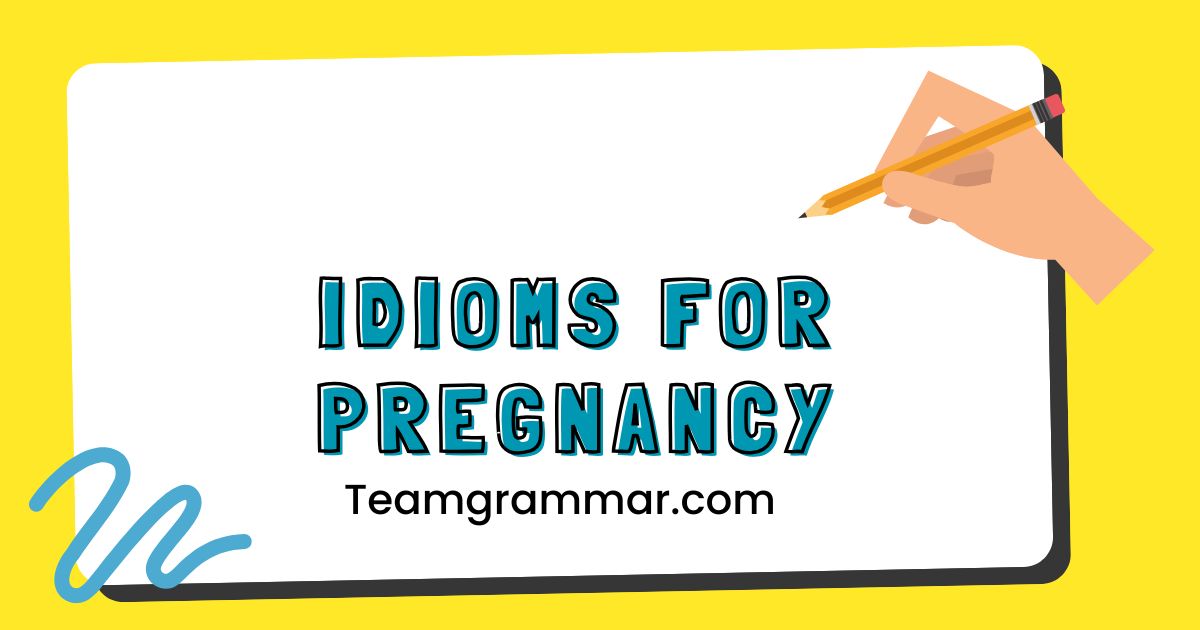29 Idioms for Pregnancy: A Comprehensive Guide
Pregnancy is a unique and transformative experience, often accompanied by a colorful array of feelings and situations. English idioms offer a vivid and nuanced way to describe these experiences, going beyond literal language to capture the emotional and physical realities of expecting a child.
Understanding these idioms enhances your comprehension of everyday conversations and written texts, particularly in informal contexts. This guide is designed for English language learners, expectant parents, and anyone interested in expanding their idiomatic vocabulary related to pregnancy and childbirth.
Table of Contents
- Introduction
- Definition of Idioms for Pregnancy
- Structural Breakdown
- Types and Categories of Pregnancy Idioms
- Examples of Idioms for Pregnancy
- Usage Rules for Pregnancy Idioms
- Common Mistakes with Pregnancy Idioms
- Practice Exercises
- Advanced Topics
- FAQ
- Conclusion
Definition of Idioms for Pregnancy
Idioms are expressions whose meanings cannot be understood from the literal meanings of the individual words. Instead, they function as a unit with a figurative or symbolic meaning.
In the context of pregnancy, idioms offer a shorthand way to describe the various physical, emotional, and social aspects of expecting a child. They often add color and depth to conversations, making the experience more relatable and understandable.
Pregnancy idioms can be classified based on the stage of pregnancy they describe, the specific feeling or situation they represent, or their level of formality. Understanding these classifications helps in choosing the appropriate idiom for a given context.
The function of these idioms is primarily to convey complex experiences in a concise and relatable manner, often adding humor or empathy to the conversation. These idioms are frequently used in informal settings such as conversations with friends and family, pregnancy blogs, and parenting forums.
They are less common in formal medical or academic writing.
Structural Breakdown
The structure of pregnancy idioms, like all idioms, is fixed. This means the words cannot be changed or rearranged without altering or losing the idiomatic meaning.
Idioms often follow common grammatical patterns, but their meaning is not derived from these patterns in a literal way. For example, the idiom “bun in the oven” uses a simple noun phrase structure, but its meaning refers to pregnancy, not baked goods.
Many idioms incorporate verbs, nouns, adjectives, and prepositions, all working together to create a figurative meaning.
The key to understanding the structure is to recognize that the entire phrase functions as a single unit of meaning. Analyzing the individual words does not provide insight into the idiom’s meaning.
Instead, one must learn the idiom as a whole. The origin of many pregnancy idioms is often rooted in cultural beliefs, historical practices, or common metaphors related to fertility and childbirth.
While understanding the origin can be interesting, it is not essential for using the idiom correctly.
Types and Categories of Pregnancy Idioms
Pregnancy idioms can be categorized based on various aspects of the pregnancy experience. Here are several categories to consider:
Idioms Describing Early Stages
These idioms often refer to the initial confirmation of pregnancy or the first few months when changes are subtle.
Idioms Describing Physical Changes
These idioms describe the physical transformations a woman experiences during pregnancy, from morning sickness to a growing belly.
Idioms Describing Emotional States
Pregnancy can bring a rollercoaster of emotions. These idioms capture the mood swings, anxieties, and joys of expecting a child.
Idioms Related to Preparing for the Baby
These idioms describe the activities involved in getting ready for the baby’s arrival, such as decorating the nursery and buying baby clothes.
Idioms Related to Labor and Delivery
These idioms refer to the process of childbirth, from the first contractions to the moment the baby is born.
Idioms Related to the Postpartum Period
These idioms describe the period after childbirth, including recovery, adjusting to motherhood, and caring for the newborn.
Examples of Idioms for Pregnancy
Here are some examples of idioms related to pregnancy, categorized for clarity:
Early Stages Examples
The following table illustrates idioms used during the early stages of pregnancy. These often relate to revealing the news or experiencing initial symptoms.
| Idiom | Meaning | Example |
|---|---|---|
| Bun in the oven | Pregnant | “She’s got a bun in the oven, so we’re expecting a new addition to the family next year.” |
| Expecting | Pregnant | “They are expecting their first child in the spring.” |
| With child | Pregnant | “She walked with a gentle grace, clearly with child.” |
| In a delicate condition | Pregnant (a more formal or old-fashioned term) | “Mrs. Smith is in a delicate condition and needs to take extra care.” |
| Knocked up | Pregnant (informal, sometimes considered rude) | “I heard Sarah got knocked up.” |
| Preggers | Pregnant (informal) | “She announced she was preggers on social media.” |
| Up the duff | Pregnant (British slang) | “My sister is up the duff again!” |
| In the family way | Pregnant (old-fashioned) | “She was described as being in the family way.” |
| Eating for two | Eating more because of pregnancy | “She’s eating for two these days, so we need to buy more groceries.” |
| Morning sickness | Nausea and vomiting during pregnancy | “She’s been battling morning sickness for the past few weeks.” |
| The stork is visiting | A baby is expected | “They’ve been hinting that the stork is visiting soon.” |
| A little bird told me | A secret was revealed (often used when announcing pregnancy) | “A little bird told me you’re expecting!” |
| Blossoming | Looking radiant and healthy due to pregnancy | “She’s really blossoming now that she’s pregnant.” |
| Hearing the pitter-patter of tiny feet | Expecting a baby soon | “They’re looking forward to hearing the pitter-patter of tiny feet.” |
| Hatching a plan | Making plans for the baby’s arrival | “They’re busy hatching a plan for the nursery.” |
| Waiting for the new arrival | Anticipating the baby’s birth | “The whole family is waiting for the new arrival.” |
| Nest building | Preparing the home for the baby | “She’s been in full nest building mode, organizing everything.” |
| On cloud nine | Extremely happy about being pregnant | “She’s been on cloud nine since she found out she was pregnant.” |
| Over the moon | Extremely happy about being pregnant (similar to ‘on cloud nine’) | “They are over the moon about the pregnancy.” |
| Tickled pink | Delighted about the pregnancy | “They were tickled pink when they found out the news.” |
| Bursting with joy | Feeling an overwhelming sense of happiness | “She’s bursting with joy about becoming a mother.” |
| Walking on air | Feeling extremely happy and lighthearted | “He’s been walking on air since they announced the pregnancy.” |
| Head in the clouds | Being dreamy and preoccupied with thoughts of the baby | “She’s had her head in the clouds, constantly thinking about baby names.” |
| A ray of sunshine | Referring to the baby as a source of happiness | “They see the baby as a ray of sunshine in their lives.” |
| A bundle of joy | Referring to the baby as a source of happiness and delight | “They’re eagerly awaiting the arrival of their bundle of joy.” |
Physical Changes Examples
This table focuses on idioms that describe the physical changes experienced during pregnancy.
| Idiom | Meaning | Example |
|---|---|---|
| Bumping along | Showing a noticeable baby bump | “She’s bumping along nicely now that she’s in her second trimester.” |
| Swollen feet | Experiencing swelling in the feet due to pregnancy | “She’s been complaining about her swollen feet lately.” |
| Gaining weight | Putting on weight during pregnancy | “She’s been gaining weight steadily, which is perfectly normal.” |
| Outgrowing clothes | Needing larger sizes due to pregnancy | “She’s outgrowing clothes rapidly and needs to buy maternity wear.” |
| Backache | Experiencing back pain during pregnancy | “She’s been suffering from a terrible backache.” |
| Feeling bloated | Experiencing abdominal distension | “She’s been feeling bloated and uncomfortable.” |
| Heartburn | Experiencing acid reflux | “She’s been getting terrible heartburn.” |
| Cravings | Having strong desires for specific foods | “She’s been having the strangest cravings!” |
| Eating pickles and ice cream | Having unusual food cravings | “She’s been eating pickles and ice cream, which is a classic pregnancy craving.” |
| Glow | Having radiant skin due to pregnancy | “She has a pregnancy glow about her.” |
| Water retention | Holding excess fluid in the body | “She’s experiencing water retention, which is making her feel uncomfortable.” |
| Breathless | Experiencing shortness of breath | “She gets breathless just walking up the stairs.” |
| Tired all the time | Feeling constantly fatigued | “She’s tired all the time, even after a full night’s sleep.” |
| Hormonal | Experiencing mood swings due to hormone changes | “She’s been very hormonal lately.” |
| Stretch marks | Developing lines on the skin due to stretching | “She’s been using cream to try to prevent stretch marks.” |
| Baby brain | Experiencing forgetfulness or difficulty concentrating | “She’s blaming her baby brain for forgetting where she put her keys.” |
| Swayback | Developing an exaggerated curve in the lower back | “She’s developed a noticeable swayback due to the weight of the baby.” |
| Waddling | Walking with a wide gait due to discomfort | “She’s starting to waddle as she gets closer to her due date.” |
| Kicking up a storm | Feeling strong baby movements | “The baby’s been kicking up a storm all day!” |
| Feeling the baby drop | Experiencing the baby moving lower in the abdomen | “She said she’s feeling the baby drop, so labor might be soon.” |
| Braxton Hicks | Experiencing false labor contractions | “She’s been having Braxton Hicks contractions for weeks.” |
| Losing the mucus plug | Experiencing a sign that labor is approaching | “She thinks she’s losing the mucus plug, which means labor is near.” |
| Water breaking | Having the amniotic sac rupture | “She’s worried about her water breaking in public.” |
| Dilating | The cervix opening in preparation for labor | “She’s been dilating slowly over the past few days.” |
| Timing contractions | Measuring the frequency and duration of contractions | “They’ve been timing contractions to see if it’s time to go to the hospital.” |
Emotional States Examples
This table provides idioms to describe the various emotional states experienced during pregnancy.
| Idiom | Meaning | Example |
|---|---|---|
| Mood swings | Experiencing rapid changes in emotions | “She’s been having terrible mood swings.” |
| Emotional roller coaster | Experiencing a wide range of intense emotions | “Pregnancy has been an emotional roller coaster for her.” |
| Anxious | Feeling worried or nervous | “She’s been feeling very anxious about the upcoming delivery.” |
| Overwhelmed | Feeling stressed and unable to cope | “She’s been feeling overwhelmed with all the preparations.” |
| Tearful | Feeling easily brought to tears | “She’s been very tearful lately, even over small things.” |
| Sensitive | Being easily affected by emotions | “She’s been very sensitive and easily hurt.” |
| Nesting instinct | Having a strong urge to prepare the home for the baby | “Her nesting instinct has kicked in, and she’s been cleaning and organizing everything.” |
| Protective | Feeling a strong desire to protect the baby | “She’s become very protective of her belly.” |
| Broody | Feeling a strong desire to have a baby | “She’s been feeling broody for a while now.” |
| Anticipating | Looking forward to the baby’s arrival | “They’re anticipating the joy of becoming parents.” |
| Dreaming of the future | Imagining life with the baby | “She’s been dreaming of the future with her little one.” |
| Worried sick | Extremely anxious about something | “She was worried sick when she couldn’t feel the baby move.” |
| On edge | Feeling nervous and irritable | “She’s been on edge lately, probably due to the stress of pregnancy.” |
| Full of hope | Feeling optimistic about the future | “They’re full of hope for the new chapter in their lives.” |
| Feeling blessed | Grateful for the pregnancy | “She’s feeling blessed to be carrying a child.” |
| Walking on eggshells | Being careful not to upset someone | “Everyone’s been walking on eggshells around her because of her mood swings.” |
| Having a meltdown | Becoming overwhelmed and emotional | “She had a meltdown when she couldn’t find the perfect crib.” |
| Feeling vulnerable | Experiencing a sense of emotional exposure | “She’s been feeling vulnerable during her pregnancy.” |
| Needing reassurance | Requiring constant support and encouragement | “She’s been needing reassurance that everything will be okay.” |
| Counting down the days | Eagerly awaiting the baby’s arrival | “They’re counting down the days until their due date.” |
| Feeling impatient | Anxious for the pregnancy to be over | “She’s been feeling impatient in her final weeks.” |
| Ready to pop | Feeling like the baby could be born any day | “She looks like she’s ready to pop!” |
| On tenterhooks | In a state of nervous anticipation | “They’re on tenterhooks waiting for labor to start.” |
| Biting nails | Feeling anxious and nervous | “She’s been biting her nails with worry about the birth.” |
| Holding breath | Anticipating something eagerly | “They’re holding their breath waiting for the baby’s arrival.” |
Preparing for the Baby Examples
The following table lists idioms describing preparations for the baby’s arrival.
| Idiom | Meaning | Example |
|---|---|---|
| Feathering the nest | Preparing the home for the baby | “They’ve been busy feathering the nest, getting everything ready for the baby.” |
| Baby-proofing | Making the home safe for a baby | “They’re baby-proofing the house before the baby arrives.” |
| Setting up the nursery | Preparing the baby’s room | “They’re setting up the nursery with a crib and changing table.” |
| Shopping for baby clothes | Buying clothes for the baby | “They’ve been shopping for baby clothes, and everything is so cute!” |
| Stocking up on diapers | Buying a large supply of diapers | “They’re stocking up on diapers to be prepared for the first few months.” |
| Taking childbirth classes | Attending classes to prepare for labor and delivery | “They’re taking childbirth classes to learn about the birthing process.” |
| Writing a birth plan | Creating a plan for labor and delivery | “They’re writing a birth plan to communicate their preferences to the medical team.” |
| Packing a hospital bag | Preparing a bag with essentials for the hospital stay | “She’s packing a hospital bag with everything she’ll need.” |
| Getting a car seat | Purchasing a car seat for the baby | “They’re getting a car seat to ensure the baby’s safety in the car.” |
| Choosing a name | Selecting a name for the baby | “They’re still choosing a name for the baby.” |
| Planning a baby shower | Organizing a party to celebrate the upcoming birth | “They’re planning a baby shower with friends and family.” |
| Registering for gifts | Creating a list of desired baby items | “They’re registering for gifts at a baby store.” |
| Preparing the siblings | Helping older children adjust to the idea of a new baby | “They’re preparing the siblings for the arrival of the new baby.” |
| Reading parenting books | Learning about childcare | “They’re reading parenting books to prepare for the challenges ahead.” |
| Joining a mommy group | Connecting with other expectant mothers | “She’s joining a mommy group to find support and friendship.” |
| Learning infant CPR | Getting trained in cardiopulmonary resuscitation for babies | “They’re learning infant CPR to be prepared for emergencies.” |
| Setting up a college fund | Saving money for the baby’s future education | “They’re setting up a college fund to start saving for the baby’s education.” |
| Updating their will | Making legal arrangements for the baby’s care | “They’re updating their will to include the baby.” |
| Arranging maternity leave | Taking time off work after the baby is born | “She’s arranging maternity leave with her employer.” |
| Finding a pediatrician | Choosing a doctor for the baby | “They’re finding a pediatrician to provide medical care for the baby.” |
| Interviewing nannies | Looking for childcare assistance | “They’re interviewing nannies to help with childcare.” |
| Making freezer meals | Preparing meals in advance for the postpartum period | “She’s been making freezer meals to have easy dinners after the baby arrives.” |
| Practicing swaddling | Learning how to wrap the baby securely | “They’re practicing swaddling with a doll.” |
| Learning to change diapers | Getting familiar with diapering techniques | “They’re learning to change diapers by watching videos online.” |
| Researching baby gear | Investigating the best products for the baby | “They’re researching baby gear to find the safest and most reliable options.” |
Labor and Delivery Examples
This table provides idioms related to labor and delivery.
| Idiom | Meaning | Example |
|---|---|---|
| Going into labor | Starting the process of childbirth | “She went into labor early this morning.” |
| Having contractions | Experiencing muscle tightening during labor | “She’s having contractions every five minutes.” |
| Pushing | Exerting effort to deliver the baby | “She’s been pushing for two hours.” |
| Delivering the baby | Giving birth to the baby | “She delivered the baby at 3:00 AM.” |
| Giving birth | The act of childbirth | “Giving birth was the hardest thing she’s ever done.” |
| Bringing a baby into the world | The act of childbirth (more poetic) | “They were so happy to bring a baby into the world.” |
| Cutting the cord | Severing the umbilical cord after birth | “The father got to cut the cord.” |
| Epidural | Pain relief during labor | “She decided to get an epidural.” |
| C-section | Cesarean section delivery | “She had to have a C-section because the baby was breech.” |
| Water breaking | The amniotic sac rupturing | “Her water broke in the middle of the night.” |
| Crowing | The baby’s head becoming visible during delivery | “The doctor said the baby was crowning.” |
| Bearing down | Pushing forcefully during labor | “The nurse told her to bear down with each contraction.” |
| Natural birth | Giving birth without medical intervention | “She wanted to have a natural birth.” |
| Inducing labor | Starting labor artificially with medication | “They had to induce labor because she was past her due date.” |
| Breech | The baby being positioned feet-first in the uterus | “The baby was breech, so she needed a C-section.” |
| Contractions getting stronger | Labor progressing | “Her contractions are getting stronger, so we’re heading to the hospital.” |
| Dilating quickly | The cervix opening rapidly | “She’s dilating quickly, so the baby will be here soon.” |
| Long labor | A labor that lasts for many hours | “She had a long labor, but it was all worth it.” |
| Easy labor | A labor that is relatively quick and uncomplicated | “She had an easy labor, all things considered.” |
| Delivering vaginally | Giving birth through the birth canal | “She delivered vaginally without complications.” |
| Midwife | A trained healthcare professional who assists with childbirth | “She chose to have a midwife assist with her delivery.” |
| Doula | A birth companion who provides support during labor | “She hired a doula to help her through labor.” |
| Water birth | Giving birth in a tub of water | “She opted for a water birth.” |
| Home birth | Giving birth at home | “They planned a home birth with a midwife.” |
| Hospital birth | Giving birth in a hospital | “They had a hospital birth with a team of doctors and nurses.” |
Postpartum Examples
This table provides idioms that describe the postpartum period.
| Idiom | Meaning | Example |
|---|---|---|
| Baby blues | Postpartum sadness or mood swings | “She’s been experiencing the baby blues since giving birth.” |
| Postpartum depression | A more severe form of postpartum mood disorder | “She was diagnosed with postpartum depression.” |
| Breastfeeding | Feeding the baby with breast milk | “She’s been breastfeeding the baby every few hours.” |
| Bottle-feeding | Feeding the baby with formula from a bottle | “They’re bottle-feeding the baby with formula.” |
| Sleepless nights | Experiencing a lack of sleep due to caring for the baby | “They’re having sleepless nights with the new baby.” |
| Running on fumes | Operating on very little sleep | “She’s been running on fumes since the baby was born.” |
| Adjusting to motherhood | Adapting to the role of being a mother | “She’s adjusting to motherhood and all its challenges.” |
| Bonding with the baby | Developing a close connection with the baby | “She’s been bonding with the baby through skin-to-skin contact.” |
| Recovering from childbirth | Healing from the physical effects of giving birth | “She’s recovering from childbirth and taking it easy.” |
| Losing baby weight | Returning to pre-pregnancy weight | “She’s trying to lose baby weight by exercising and eating healthy.” |
| Feeling overwhelmed | Feeling stressed and unable to cope with the demands of motherhood | “She’s been feeling overwhelmed with the responsibilities of being a new mom.” |
| Needing help | Requiring assistance with childcare and household tasks | “She’s been needing help from family and friends.” |
| Getting back into shape | Regaining physical fitness after pregnancy | “She’s getting back into shape by going for walks.” |
| Returning to work | Going back to a job after maternity leave | “She’s preparing to return to work after her maternity leave is over.” |
| Juggling work and motherhood | Balancing the demands of a job and raising a child | “She’s juggling work and motherhood and finding it challenging.” |
| Finding a routine | Establishing a consistent schedule for the baby and the family | “They’re trying to find a routine that works for everyone.” |
| Enjoying every moment | Cherishing the experience of being a new parent | “They’re enjoying every moment with their little one.” |
| Sleep-deprived | Lacking sufficient sleep due to caring for the baby | “They’re both sleep-deprived, but they wouldn’t trade it for the world.” |
| Learning the ropes | Becoming familiar with the tasks and challenges of parenthood | “They’re still learning the ropes of being parents.” |
| Newborn bubble | A period of intense focus on the baby and limited social interaction | “They’re in a newborn bubble, spending all their time with the baby.” |
| Skin-to-skin | Holding the baby against the bare skin to promote bonding | “They’re doing skin-to-skin to help the baby feel secure.” |
| Babywearing | Carrying the baby in a sling or carrier | “She’s been babywearing to keep the baby close while she does chores.” |
| Baby talk | Speaking in a high-pitched, simplified manner to the baby | “They’ve been using baby talk with the little one.” |
| Mommy brain | Experiencing forgetfulness or difficulty concentrating due to sleep deprivation and stress | “She’s blaming her mommy brain for misplacing her keys.” |
| Mommy guilt | Feeling guilty about not being a perfect parent | “She’s been experiencing mommy guilt about going back to work.” |
| Playdate | Arranging social time for the baby with other children | “They’re setting up a playdate with another baby in the neighborhood.” |
| First smile | The baby’s first genuine smile | “They’re eagerly awaiting the baby’s first smile.” |
| First steps | The baby’s first independent steps | “They’re excited for the baby’s first steps.” |
Usage Rules for Pregnancy Idioms
Using idioms correctly requires understanding their specific context and connotations. Pregnancy idioms are generally used in informal settings, such as conversations with friends, family discussions, or casual writing.
They are less appropriate in formal medical reports or academic papers. Pay attention to the audience and the setting to ensure the idiom is well-received.
Some idioms, like “knocked up,” can be considered offensive, so use them with caution and awareness.
When using an idiom, be sure to use it in its entirety without altering the words. Changing even a single word can destroy the idiomatic meaning.
Also, consider the cultural context. Some idioms may be more common or understood in certain regions or communities than others.
If you’re unsure, it’s best to err on the side of caution and choose a more universally understood expression.
Common Mistakes with Pregnancy Idioms
One common mistake is altering the wording of the idiom. For example, saying “bun in their oven”bun in their oveninstead of “bun in the oven”bun in the ovenchanges the meaning and sounds incorrect.
Another mistake is using idioms in inappropriate contexts, such as a formal business meeting. For instance, saying “She’s got a bun in the oven”She’s got a bun in the ovenduring a professional presentation would be highly inappropriate.
Also, misinterpreting the meaning of the idiom can lead to confusion or miscommunication. For example, thinking that “eating for two” means literally doubling the food intake is incorrect.
Be aware of idioms with negative connotations. Using “knocked up”knocked upin a conversation with someone who might be sensitive about the pregnancy could be offensive.
Always consider the potential impact of your words and choose idioms that are respectful and appropriate for the situation.
Practice Exercises
Advanced Topics
For advanced learners, exploring the etymology of pregnancy idioms can provide deeper insights. Researching the historical context and cultural influences behind these expressions can enrich your understanding.
Additionally, compare pregnancy idioms across different languages. This cross-cultural analysis can reveal interesting similarities and differences in how various societies perceive and describe pregnancy.
Consider also how pregnancy idioms evolve over time. Language is dynamic, and new idioms emerge while older ones may fall out of use.
Staying attuned to these changes will keep your language skills current and relevant.
FAQ
Conclusion
Understanding and using idioms related to pregnancy can greatly enhance your English language skills. These expressions provide a unique and colorful way to describe the multifaceted experience of expecting a child.
By learning the definitions, usage rules, and common mistakes associated with these idioms, you can communicate more effectively and connect with others on a deeper level. Continue to practice and explore these expressions to further enrich your vocabulary and linguistic abilities.







